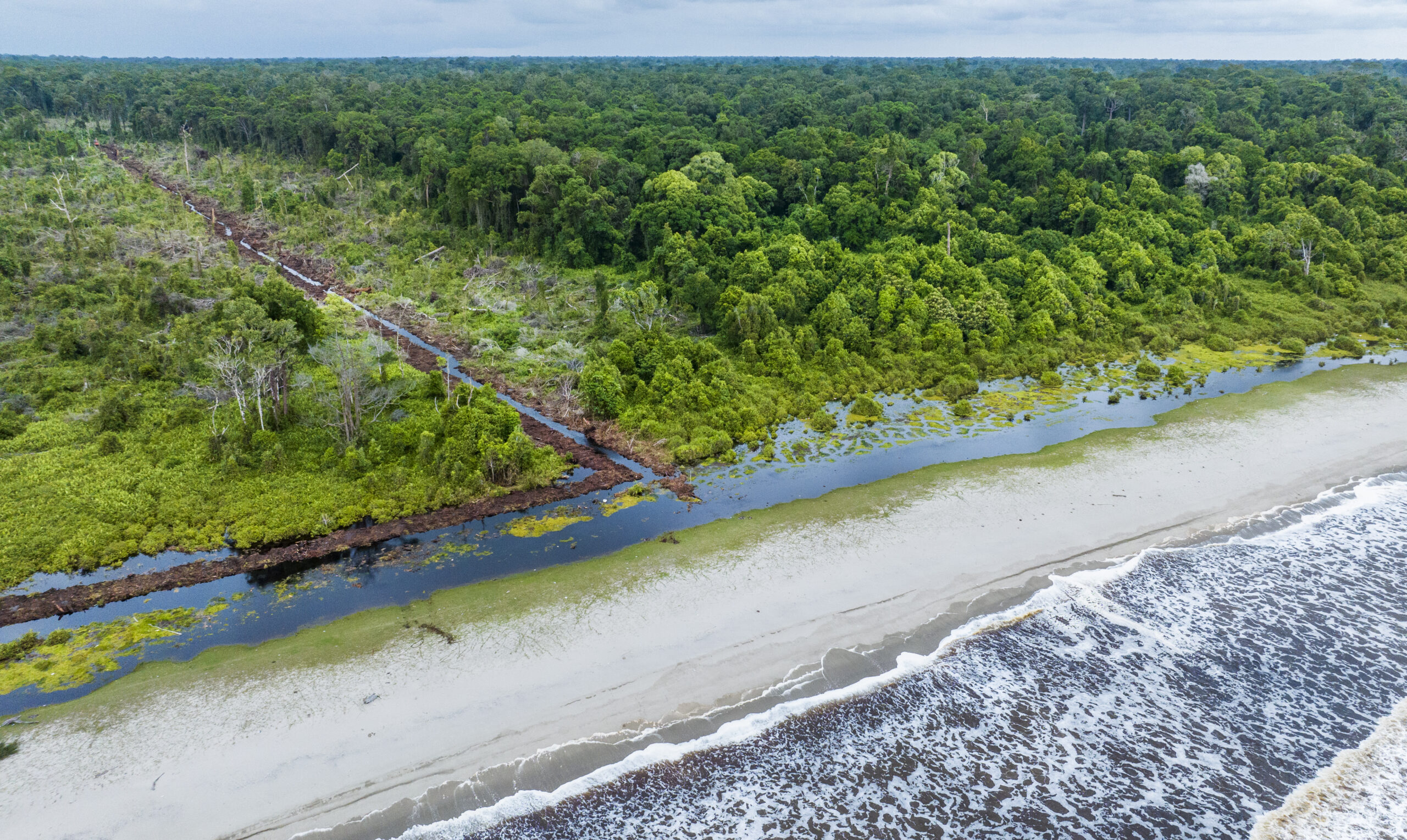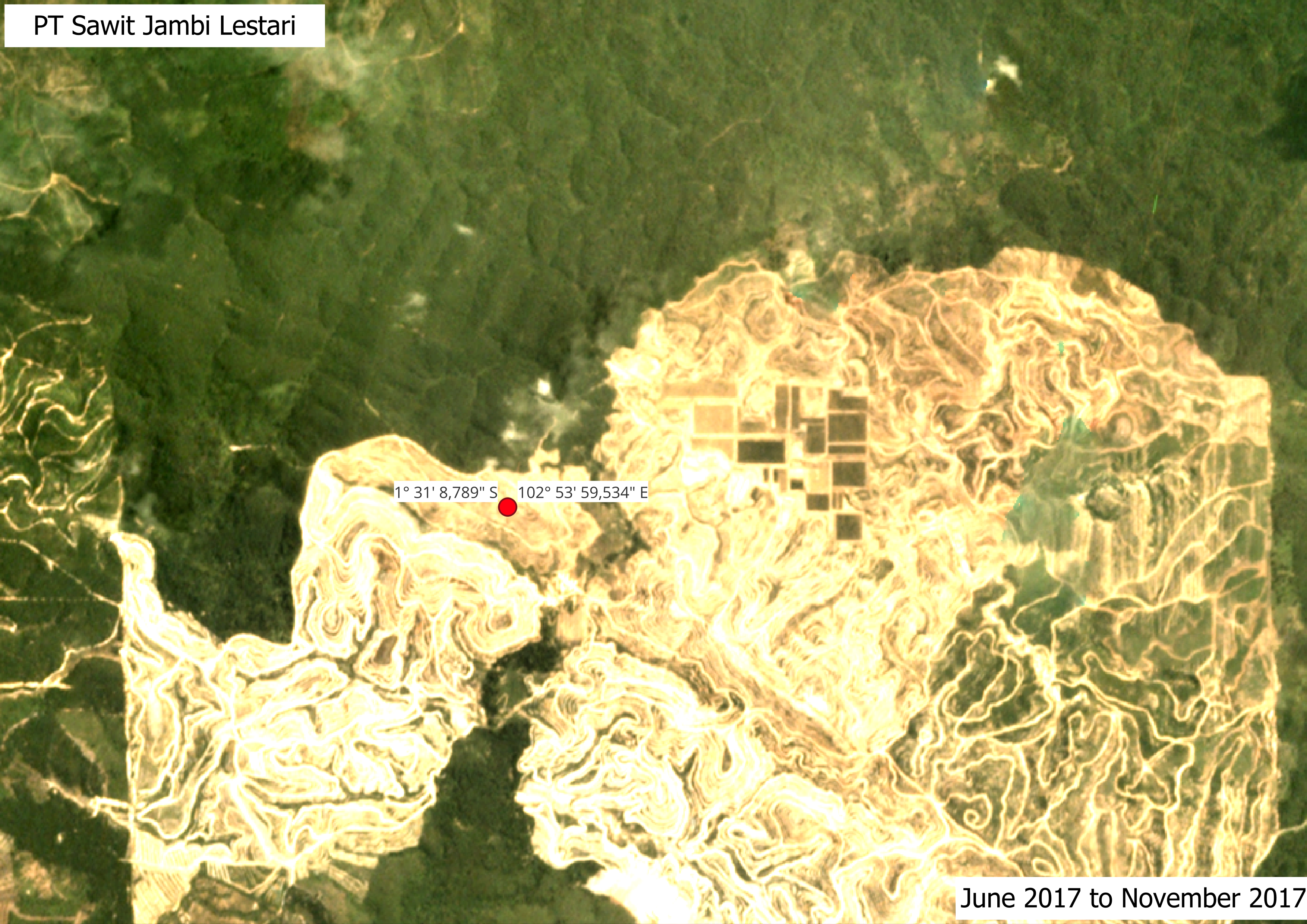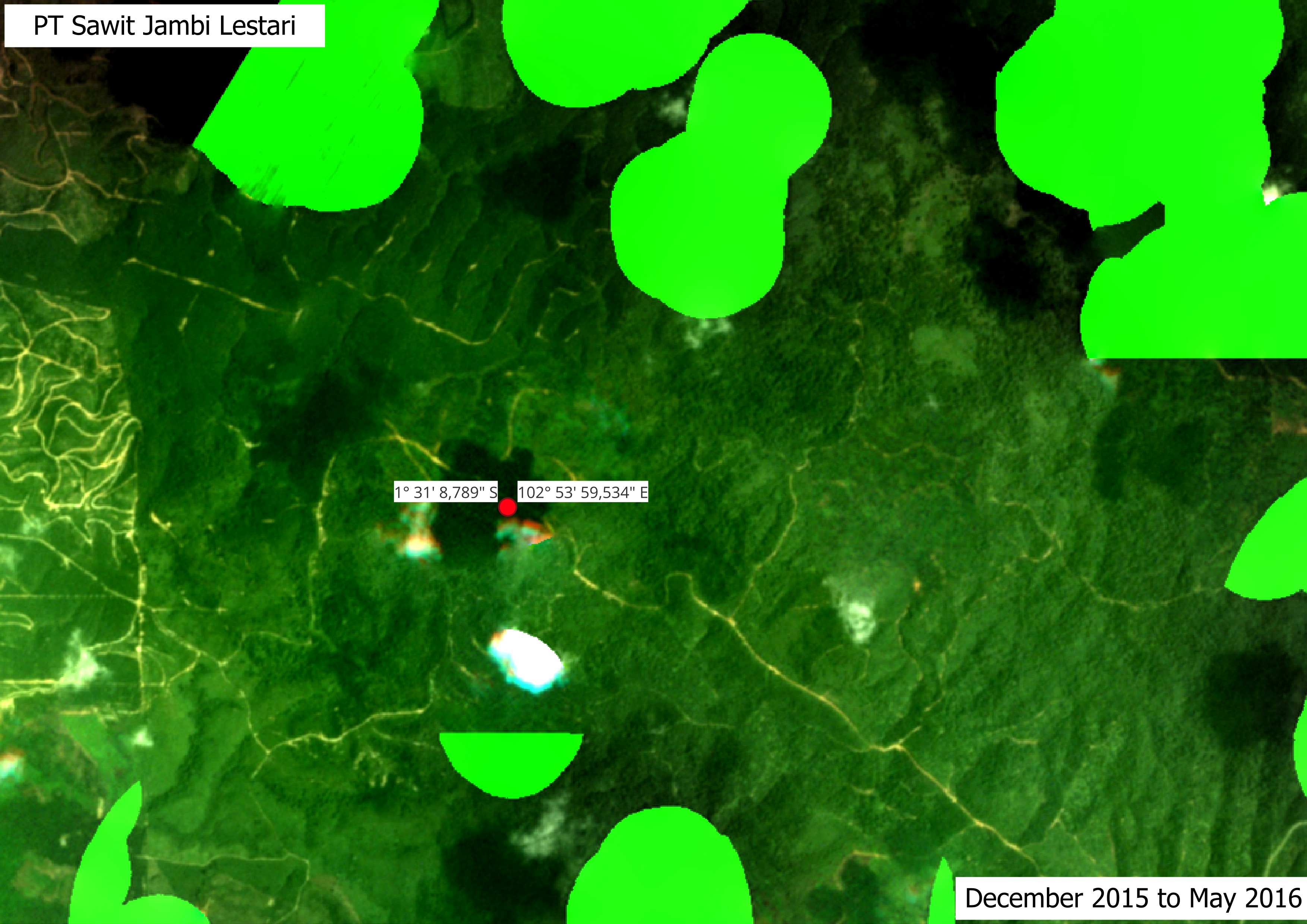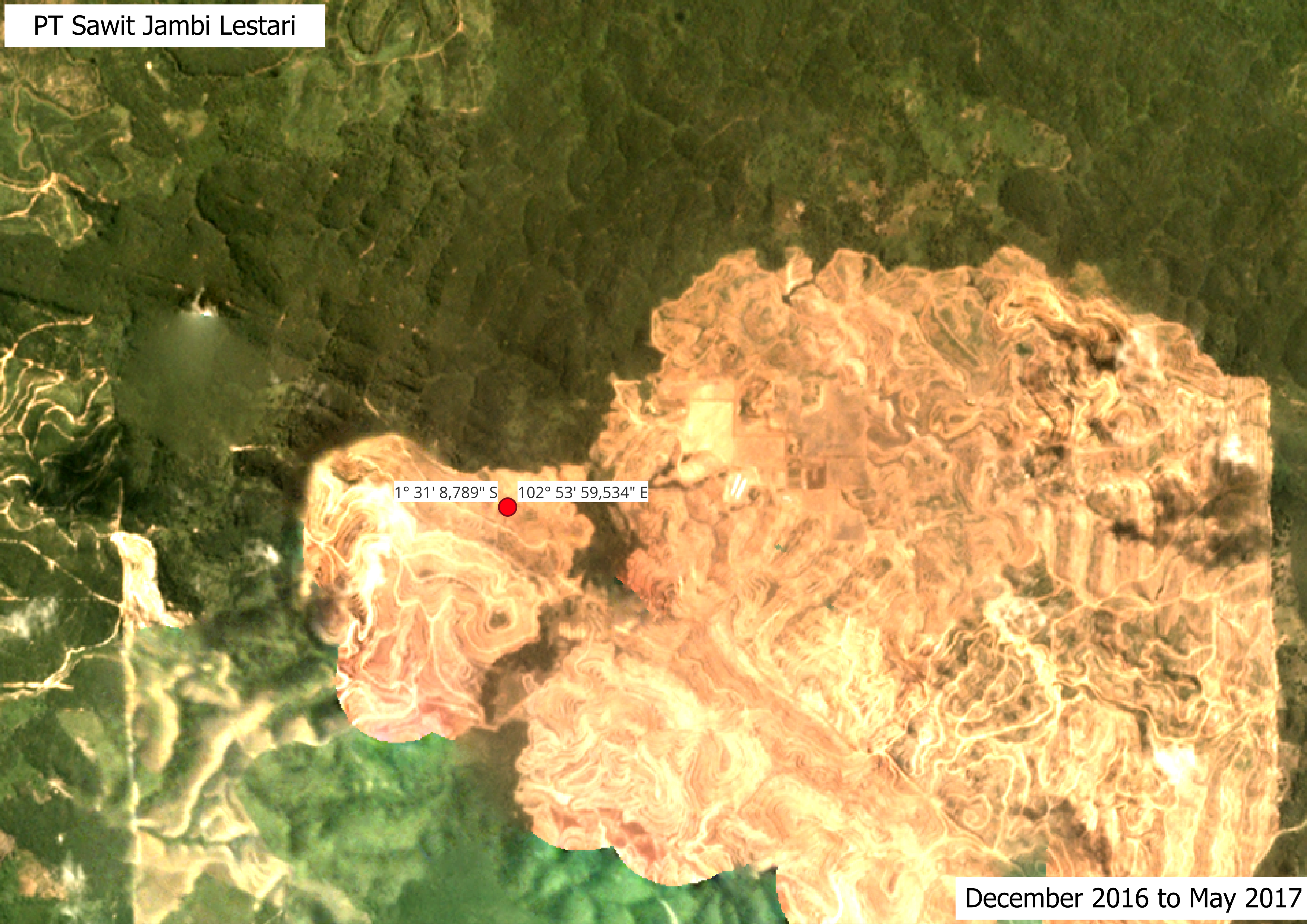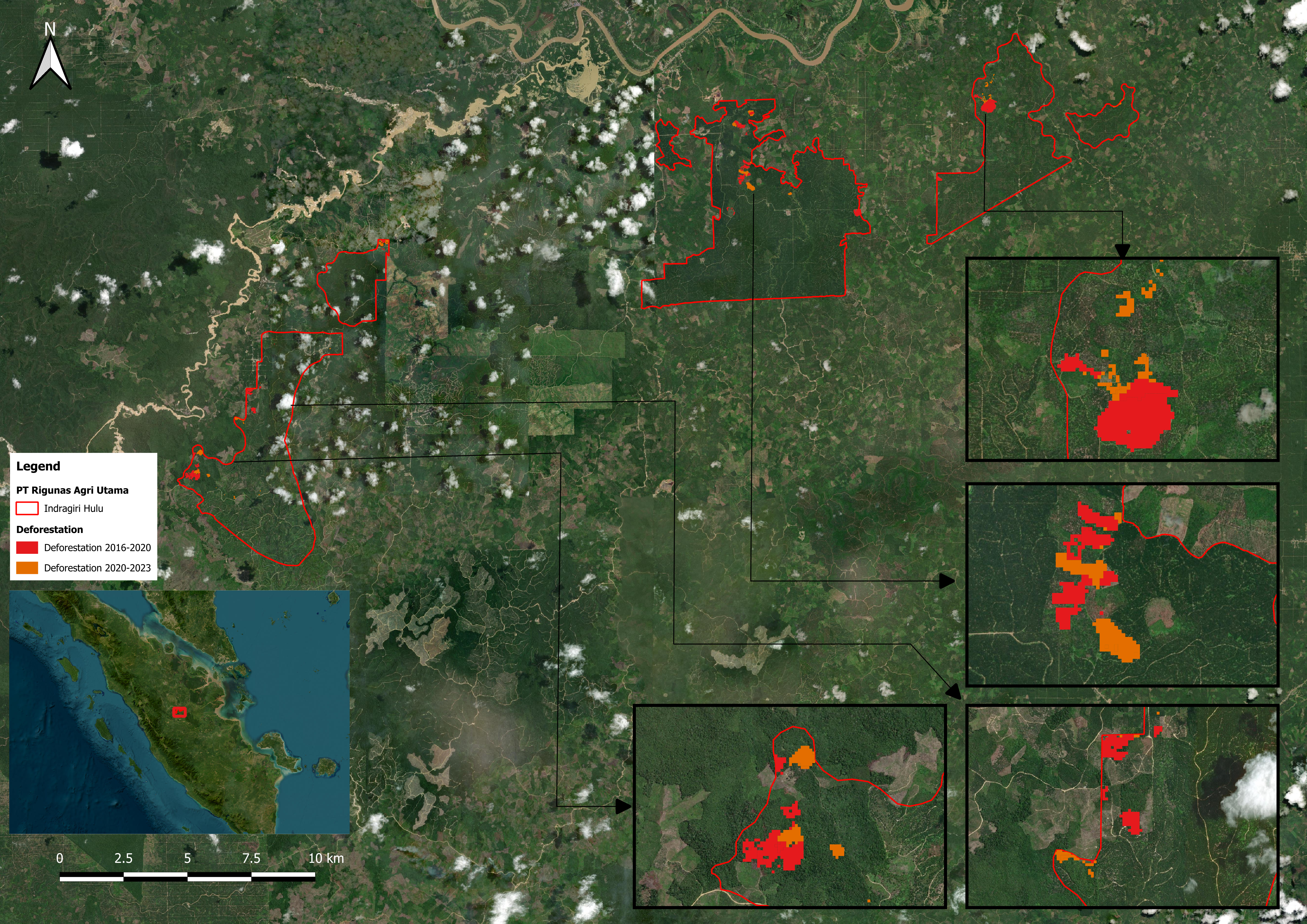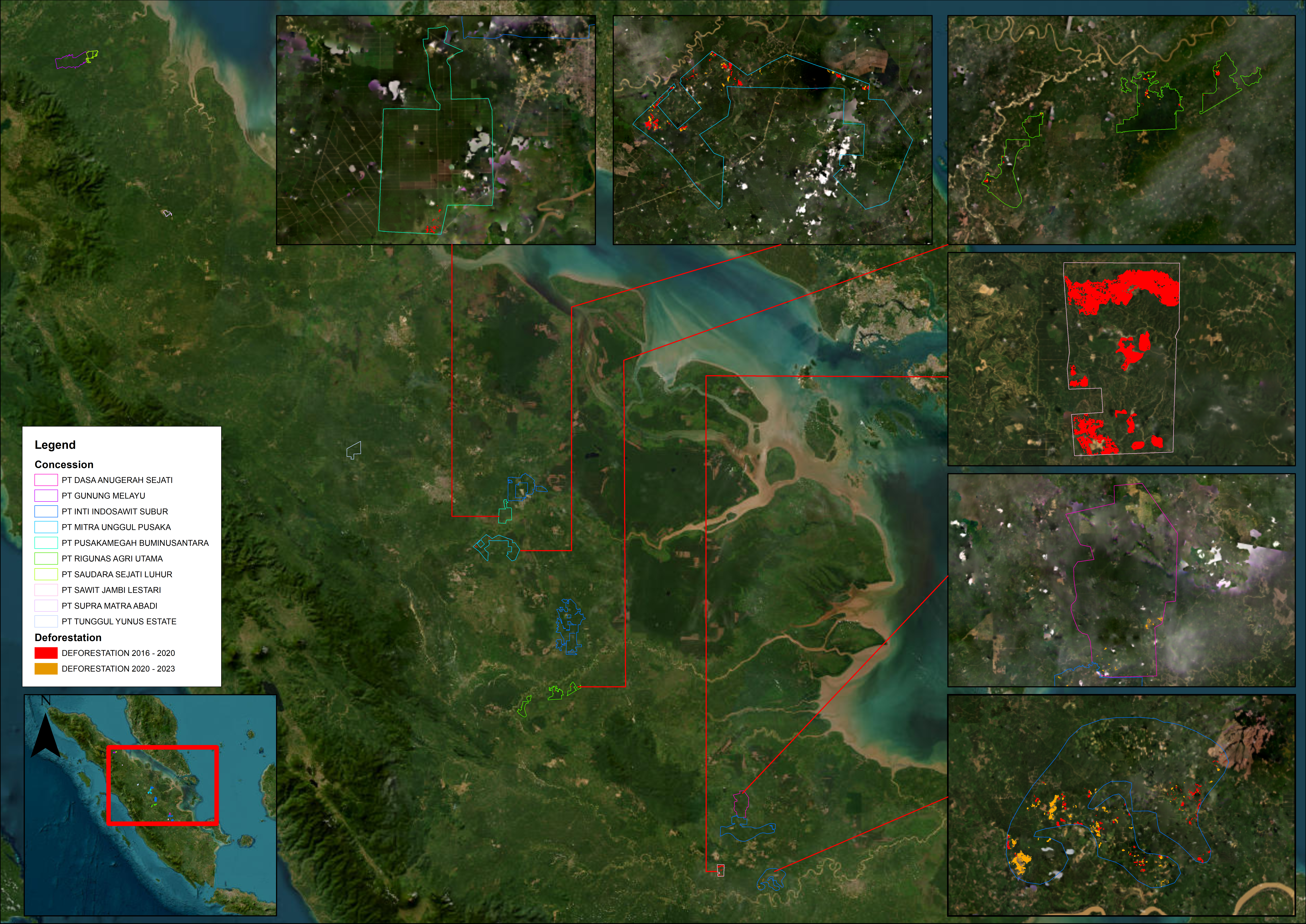Key Findings
- Royal Golden Eagle Group palm oil and pulp & paper business has received US $4.9 billion in sustainability linked loans and other sustainability finance since 2021.
- Mitsubishi UFJ Financial Group (MUFG) is estimated to have contributed US $630 million in credit and underwriting since 2016, acting as a key lead arranger and sustainability advisor. This green finance is reported to incentivize “zero tolerance for deforestation” and “radical traceability and transparency” among other goals.
- In reality, deforestation has persisted in RGE’s palm oil operations, with over 1,475 hectares (3,645 acres) cleared inside the concessions of its palm oil producer Asian Agri and known suppliers to its palm oil trader Apical since it committed to ending deforestation. Apical, RGE’s palm oil trading arm, also remains exposed to deforestation and the sourcing of illegal palm oil in its supply chains.
- Sustainability finance does not appear to address impacts across the wider RGE corporate group. ‘Shadow’ companies connected to RGE are among the leading drivers of deforestation in Indonesia.
- Despite failing to halt deforestation, both Asian Agri and Apical have continued to supply palm oil to major brands including Procter & Gamble, Mondelēz, Unilever, Kao, PepsiCo, Nestlé, Ferrero, and Nissin Foods.
- The documented deforestation after December 2020 should preclude palm oil products produced by the RGE group from the EU market under the new EU Deforestation Free Regulation (EUDR).
- RAN is calling on all actors that finance, do business with, or source from the RGE Group to immediately suspend business relations with the RGE Group.
Billions in Sustainable Finance Greenwash
As one of Indonesia’s largest contributors to deforestation over recent decades, Royal Golden Eagle Group (RGE) has developed a slick public relations campaign to rehabilitate its reputation. In 2015, RGE committed to a No Deforestation, No Peatland, No Exploitation (NDPE) policy, in an effort to persuade international markets that its pulp and palm oil businesses could be sustainable.
Since then, RGE — a privately owned conglomerate controlled by Indonesian tycoon Sukanto Tanoto and family – has secured massive amounts of credit — US$ 8.12 billion (2016-2023) to expand its palm oil and pulp & paper business. RGE appears to be increasingly using its financing as a PR strategy, securing endorsements from major international banks for its sustainability performance. The group has secured at least US $4.9 billion in sustainability-linked loans and derivatives since 2022.1
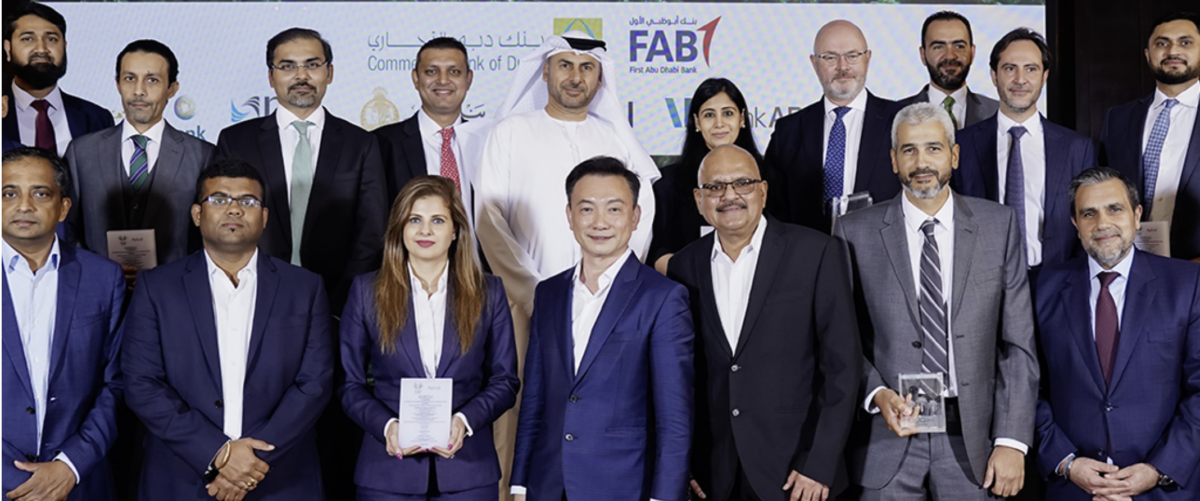
Japanese megabank Mitsubishi UFJ Financial Group (MUFG) (TYO:8306) has played a crucial role as a joint lead arranger and sustainability advisor on two of these sustainability loans, amongst a syndicate of eight banks. All in all, MUFG’s individual credit to RGE group since 2016 is estimated to be US 630 million.2
In theory, sustainability-linked loans (SLLs) are meant to incentivize the borrower – in this case RGE – to improve its environmental performance by reducing the interest repayments on its loan if it can meet specified environmental or other targets. If it fails to meet targets, then it pays a higher interest rate. In practice, however, financial regulators have expressed concerns around SLL greenwashing, specifically that banks have a potential conflict of interest to negotiate loans with unambitious and poorly defined targets and methods for measuring the sustainability performance, in order to bolster their own claims to be providing “sustainable finance” rather than delivering real world impact.
MUFG’s Singapore office appears to hold a close relationship with RGE group. Nick Yee, an MUFG managing director, states the bank “leveraged its ESG financing expertise to create a bespoke structure for RGE.” This lead arranger role typically means that MUFG negotiated the targets of the loan and sought other banks’ participation in it. RGE claims that these SLLs are working towards broad goals that include “zero tolerance to deforestation” and “radical traceability and transparency.”
Contrary to RGE’s PR, RAN’s analysis indicates that RGE’s palm oil businesses — Asian Agri and Apical — receiving the sustainability loans have continued to be associated with the clearance of natural forests in Indonesia, and are failing to implement their policies and commitments. Moreover, RGE is connected to a number of other companies in the pulp & paper sector that are the leading drivers of deforestation in Indonesia. These ‘shadow companies’ are not formally acknowledged to be part of RGE group, with control obscured by complex owner and director relationships (covered below).
The Evidence: Sustainability-Linked Deforestation
To monitor RGE’s performance on its no deforestation commitments, RAN commissioned satellite analysis of natural forest loss within 16 palm oil concessions connected to Asian Agri from 2016-2023 (for methodology, see below). RGE confirmed that 14 of these are its plantations but claims that two are suppliers to its palm oil trading arm Apical. For more details on RGE’s response, see the full report here.
This analysis indicates that there has been persistent clearance of natural forests totaling 1,475 hectares (3,645 acres). While some of its concessions saw no conversion after 2016, deforestation has persisted across five concessions in Jambi and Riau provinces. This means that annual deforestation across Asian Agri concessions or known suppliers to Apical has not stopped but has been increasing since 2019, from 64 hectares in 2019, to 165 hectares in 2023, demonstrating a persistent failure to implement its NDPE policy. RAN put our allegations to the RGE Group, whose responses dispute the findings and are outlined below.
This satellite analysis builds on evidence from recent RAN field investigations showing that Apical’s inadequate policies and due diligence resulted in sourcing from oil palm producers illegally operating inside the nationally protected Rawa Singkil Wildlife Reserve, part of the Leuser Ecosystem, an area known as the Orangutan Capital of the World. Since then, Apical has failed to enforce its sustainability policy and continues to source from palm oil mills contributing to expansion into the Leuser.
The deforestation inside Asian Agri concessions includes 448 ha (1,107 acres) cleared since December 2020, which should preclude the importation of Asian Agri’s palm oil products into the EU market under the EU Deforestation-Free Regulation (EUDR). It also presents further evidence of the RGE Group’s violation of the deforestation cut-off date for FSC Full Forest Management certification. This should prohibit the proposed end of RGE’s pulp division Asia Pacific Resources International (APRIL) disassociation with FSC, and the association of PT. Toba Pulp Lestari with FSC. This concerning uptick in deforestation aligns with Asian Agri backsliding on its NDPE policies and implementation. In 2023, it walked away from its membership in the High Carbon Stock Approach — the leading methodology for NDPE implementation.

Asian Agri and Apical are recipients of the billions in sustainable finance intended to implement “zero tolerance to deforestation.” Given the evidence of continued deforestation in RGE’s palm oil supply chain, how exactly have RGE and its banker MUFG agreed to measure its sustainability performance? In response to RAN’s questions, RGE said that KPIs [Key Performance Indicators] for the SLLs were discussed and agreed with its creditors, based on the provision of a Second Party Opinion by Environmental Resource Management – an independent assurance company, and that these KPIs are monitored and validated through a third party audit, though it omitted to disclose who the auditor is. RGE cited its Key Performance Targets as: “1. Increase the number of NDPE-compliant suppliers to 100% by 2025; 2. Increase the number of suppliers carrying out independent traceability verification to 100% by 2025; and 3. Increase the utilization of energy derived from renewable and clean energy sources to 12% by 2025.”
However the devil is in the details and RGE has declined to publicly disclose the underlying details of how they are measuring deforestation, and overall NDPE-compliance. MUFG declined to make any comment, citing client confidentiality. This evidence suggests that so far, MUFG’s engagement has not resulted in RGE, or its suppliers, eliminating deforestation from their supply chains or achieving NDPE compliance.
When asked to comment on the findings of the satellite analysis commissioned by RAN, RGE states that “RAN’s allegations of deforestation are incorrect.” They claim that the identified forest loss in two Asian Agri concessions — PT Inti Indosawit Subur and PT Dasa Anugerah Sejati — occurred outside of its concession boundaries. RGE refused to share spatial data proving the claimed boundary revision, claiming it is against Indonesian law to do so.
RGE stated that deforestation in a further two concessions — PT Mitra Unggul Pasaka and PT Rigunas Agri Utama — were areas occupied and cleared by local communities, and at PT Sawit Jambi Lestari, claimed that at the coordinates where deforestation was detected in 2017-2020 (highlighted in the image carousel above) “there was no secondary dryland forest or other indicative HCS areas.”
The maps shown in the gallery below shows where forests have been cleared within Asian Agri’s palm oil concessions and the concessions of two suppliers to Apical, between 2016 and 2023.
Real Transparency Required
Another stated goal of RGE’s sustainability-linked loans is “radical transparency and traceability.” However, RGE’s claims of transparency under its SLLs are incompatible with the way RGE’s beneficial owners – Indonesian tycoon Sukanto Tanoto and family — have structured their corporate empire. Their operations are owned and controlled through a complex and opaque series of investment-holding and financing companies across low tax secrecy jurisdictions like the British Virgin Islands, Bermuda and Samoa.
There is mounting evidence, using agreed-upon definitions of the Accountability Framework initiative, that the RGE group is much larger than formally acknowledged, extending to include numerous “off balance sheet” or “shadow companies” over which they exert influence and control. These companies include industrial tree plantation companies that are leading drivers of deforestation in Indonesia, and a company constructing a multi-billion dollar pulp mill close to some of Borneo’s last intact rainforests (see Pulping Borneo, 2023 and Deforestation Anonymous, 2024).
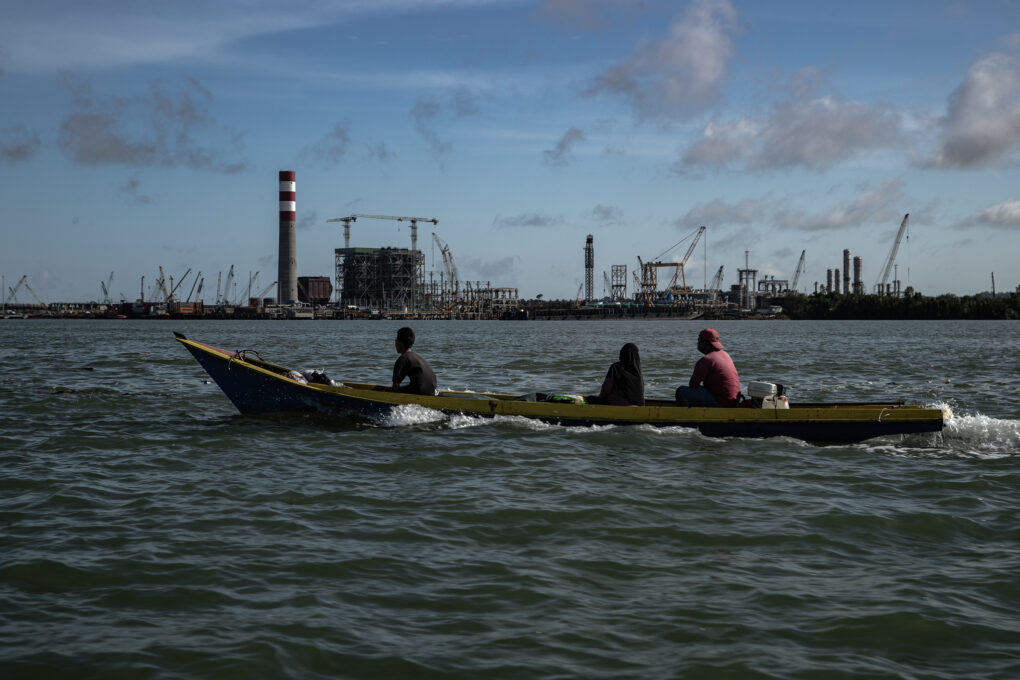
MUFG and RGE’s other creditors, together with the major brands that buy their products, cannot ignore the evidence of deforestation within Asian Agri plantations, within the concessions and supply chain of suppliers to Apical, and the massive risk across the wider RGE group, including its shadow operations.
To mitigate the risk of greenwashing through SLLs, the Asia Pacific Loan Market Association, the finance sector body that sets standards and best practices for the region recommends that borrowers – in this case RGE – disclose the details of its sustainability performance targets as well as underlying assumptions and methodologies. In our correspondence with RGE, they did not disclose Key Performance Indicators, methodologies or assumptions – for their SLLs. Without such detailed disclosures, RGE’s SLLs are effectively inscrutable.
This should add to concern by financial regulators that Sustainability Linked Loans are simply a way for banks like MUFG to develop new revenue streams, under the guise of sustainable finance, rather than a genuine effort to mitigate risk and impacts across their portfolio.
The Market Connections
During the period where deforestation persisted inside Asian Agri’s palm oil concessions in Indonesia and those of its suppliers, RGE was supplying palm oil to major brands including Procter & Gamble, Mondelēz, Kao, PepsiCo, Unilever, Nestlé, Ferrero, and Nissin Foods. The RGE’s group also continues to profit from its joint venture operations with Kao.
- Colgate-Palmolive and Kao have recently strengthened their No Deforestation, No Peatland and No Exploitation (NDPE) policies to require adherence at a corporate group level. Kao recently published its first forest footprint for its palm oil supply chain in Riau which confirms its sourcing of palm oil from Asian Agri and Apical and its partnerships with both RGE companies. Colgate-Palmolive recently published its grievance log – which recognizes the complaint that has been raised against the Royal Golden Eagle Group – but to date it has failed to list the controversial supplier on its No-Buy list. However, Colgate-Palmolive’s most recently published mill lists do not include RGE palm oil companies as suppliers.
- Mondelēz is the only brand that has issued a statement claiming it does not source from RGE, but its latest published mill list lists RGE’s palm oil companies as suppliers. The updated mill list confirms Mondelēz was sourcing from RGE’s Asian Agri subsidiaries during the period of deforestation cited in this investigation. Similarly Ferrero has indicated they would remove RGE from their supply chain, yet their most recently published mill list continues to include RGE.
- Major consumer brands must take immediate action to implement their NDPE policies and ensure their suppliers are operating in compliance with the EU Deforestation Free Regulation. In this case, it is clear that their palm oil supplier Asian Agri has violated the December 2020 deforestation cut-off date. Brands’ continued business with RGE poses major risks for brands and their investors.
- RGE press release stated that it received US$1.6 billion in SLLs in 2022, another US$ 787 million SLL in 2023 and related US $550 million SLD. In 2024, it announced a US$1 billion SLL and US$1 billion SLD.
- MUFG’s financing of RGE Group uses data from Forests & Finance for credit 2016-September 2023. For the 2024 Sustainability Linked Loan, MUFG’s estimated contribution is calculated using the book-value method, see section 3.1 of methodology. This figure does not factor in any contribution for the US $1 billion sustainability linked derivative.
